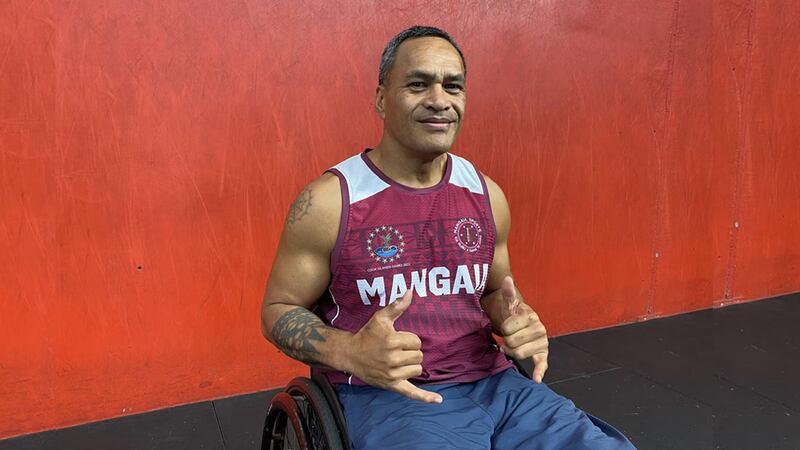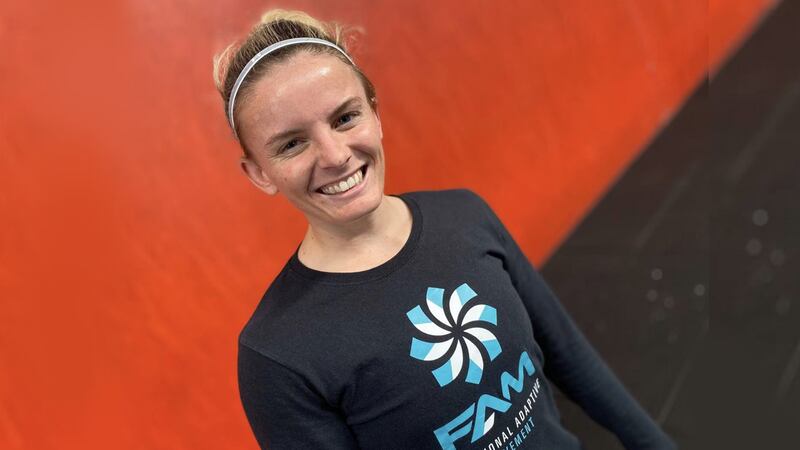-By William Sangster, Te Rito Journalism Cadet. Public Interest Journalism funded through NZ On Air
In 1995, Miimama Pepe fell from a waterfall and was left paralysed from the hips down.
Pepe, 49, from the Cook Islands, sustained a fractured spine with level two-three vertebrae injuries in the accident in Rarotonga.
Using a wheelchair, Pepe’s will to succeed is clear.
“I [have] got nothing to lose, always testing my limit, [I] believe in myself as para adaptive, enjoy your life.”
Para adaptive is accessible sports that are competitive for people with disabilities.
Pepe has been selected to represent New Zealand’s Adaptive Elite Team for waka ama at the World Long Distance Championships in August in Samoa.
He is also an NZ representative in wheelchair basketball and has travelled across the world competing.

Miimama Pepe will represent New Zealand’s Adaptive Elite Team at the World Long Distance Championships in Samoa.
From his sporting experience, Pepe gives back to the community as a volunteer mentor and coach to other spinal injured athletes, including the Auckland Wheelbreakers Basketball Club.
“I also support school programmes for injured or disabled children teaching safety techniques for wheelchair basketball.”
Pepe has succeeded in waka ama locally and globally.
‘The sport has seen me accomplish further achievement in winning national championships competing against able-bodied athletes.”
Pepe came home from the waka ama world sprints event in the United Kingdom with five gold medals, three silvers and a bronze.
But the big highlight of his waka ama journey so far is winning the Disability Sport Auckland Award 2022 Athlete of the Year.
Pepe is an active Functional Adaptive Movement (FAM) gym member.
Pepe says the gym - designed for people with disabilities - helped motivate him to represent NZ in the 2024 Para Olympics.
“I joined the gym because I believe this is where special elite athletes come to prepare themselves. To sort of work on your mindset and get reps in, and on the racetrack”.
Pepe says there should be more adaptive gyms like FAM across the country.
“There’s not much else out there. There is lots of different sorts of disability; we still need to push them to come in.”
The FAM gym
Functional Adaptive Movement (FAM) helps people with disabilities by providing an accessible gym.
Established in 2018, eight FAM gyms have assisted over 500 people living with various disabilities in New Zealand.
Struck by a car in 1994, David Cooper, 51, cannot walk unaided and struggles with his memory, speech and cognitive movement.
Cooper says that FAM has been great for his disability.
“It has given me more confidence. My body is a temple, which helps my body respond, so I enjoy it.
“This gym has helped me with my strength to push the chair and work on my body. That is why I attend all the time because it gets easier and easier.”
Jodie Loveday, 27, a strength and conditioning coach at the gym, described FAM as a programme designed for all.
“Anybody and anyone living with a physical or intellectual disability. We try to create an inclusive community with it and around it.
“Especially in a society where people try to put you in boxes or try to label you as something. We just want everyone and anyone to feel like they can come in and have a safe space and just do some fitness.”

Jodie Loveday, 27, a strength and conditioning coach at the gym, described FAM as a programme designed for all.
Loveday hopes that more gyms like FAM are going to expand.
“I feel like hopefully years to come; we won’t need such a realm of like being a specific niche to the disability community.
“I would hope that any gym out there can be accessible and have the tools to facilitate anyone and everyone without having to be specifically labelled as somebody who helps coach the disability community within the health and fitness industry.”


